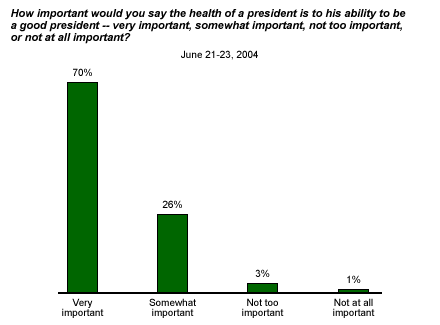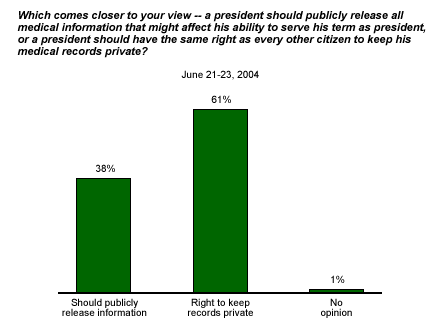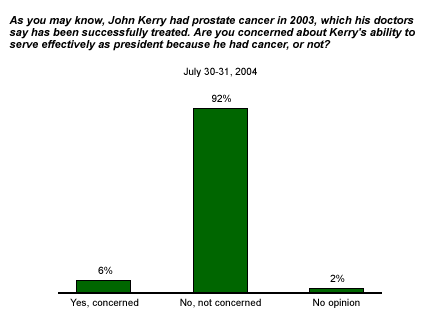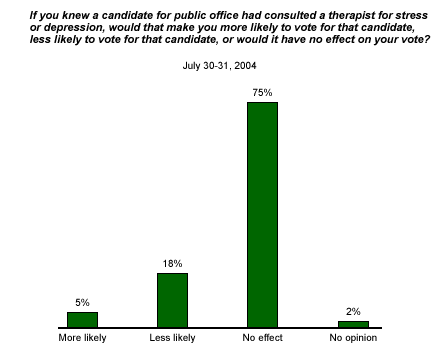As the leader of the free world, the president has access to the finest round-the-clock medical care -- but even with the best healthcare available, the demands of the office can take their toll. When they do, what health information should a president be required to reveal? For that matter, what should a candidate for the highest office in the land be required to reveal? While Americans say that the president's health is important to his ability to serve, they also believe he should have a right to medical privacy.
A ║┌┴¤═° Poll on the subject of presidential health conducted this summer* reveals that most Americans (96%) feel that the health of the commander in chief is important to his ability to be a good president, with 70% saying "very important" and 26% saying "somewhat important." A majority (61%) also feels that a sitting president should have the right to keep his medical records private, rather than release all medical information that may affect his ability to serve. Nearly 4 in 10 Americans think that the president should publicly release that information rather than have the right to keep it private.


Still, most Americans (84%) feel that the president of the world's most powerful nation should be required to take a physical exam to check the condition of his health, and a similar percentage (79%) feel that he should be required to have an annual exam to check for mental conditions, such as depression or Alzheimer's disease.
Campaign Pain?
Would information about a candidate's health affect a voter's decision on Election Day? The "what ifs" are hard to answer. Boston University professor Robert Dallek recently revealed information on the state of President John F. Kennedy's health in his biography, An Unfinished Life. In researching his book, Dallek discovered that Kennedy suffered from Addison's disease, severe back pain, colitis, and other illnesses, yet most biographical sketches during his candidacy and presidency painted portraits brimming with health and energy. If Americans had known how ill Kennedy was on the campaign trail, would it have become a major campaign issue?
Today, campaigns are waged under different rules and there is greater pressure on candidates to reveal the minutiae of their medical histories and their health prognoses to voters. Candidates have learned that it is better to be forthright about such issues before the opposing camp learns about them and discloses them first. Vice President Dick Cheney's heart problems are an example, as is Democratic presidential candidate John Kerry's successful battle with prostate cancer.
When Americans were asked in late July** about whether Kerry's bout with cancer concerned them, 92% said they were not concerned that this would interfere with his ability to serve. There appears to be a rare instance of bipartisan agreement on this question: Republicans and Democrats appear equally unconcerned that Kerry's bout with prostate cancer might create problems that affect his ability to serve as commander in chief.

In the same survey, Americans were asked about their likelihood of voting for a candidate for political office if that candidate consulted a therapist for stress or depression. The survey finds that three-quarters of the nation's adults feel that such a consultation would not affect their voting intentions.

Bottom Line
The advent of the Internet -- as well as a reduction in the set of topics considered to be journalistically "off-limits" -- have, for better or worse, provided greater access to personal information about political candidates. We know now that many presidents suffered from a variety of illnesses -- President Richard Nixon likely suffered from depression, President Ronald Reagan underwent four surgeries, President Dwight D. Eisenhower suffered a heart attack and a stroke, President Franklin Delano Roosevelt long hid the intensity of his battle with polio and other conditions, and President Woodrow Wilson suffered a massive stroke in his second term, to mention just a few.
*Results are based on one of two surveys. The telephone interviews with 1,005 national adults, aged 18 and older, were conducted June 21-23, 2004. For results based on the total sample of national adults, one can say with 95% confidence that the margin of sampling error is ±3 percentage points.
**Results are also based on telephone interviews with 1,011 national adults, aged 18 and older, conducted July 30-31, 2004. For results based on the total sample of national adults, one can say with 95% confidence that the margin of sampling error is ±3 percentage points.